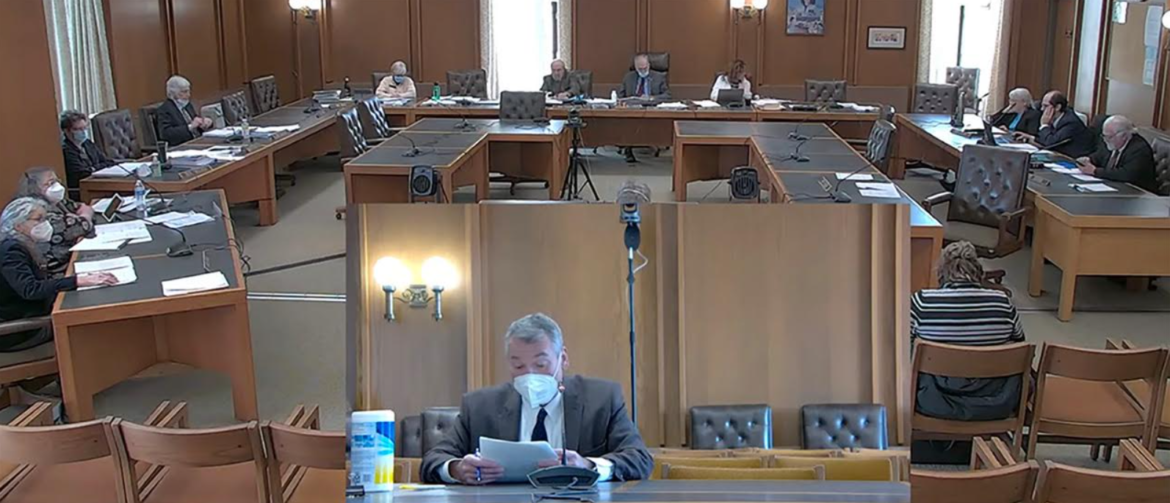By Thomas P. Caldwell, InDepthNH.org
CONCORD — The House Education Committee closely questioned those testifying on behalf of bills proposing changes to the state’s new Education Freedom Accounts on Friday.
Those changes ranged from provisions to prevent fraud to banning the use of any money from the state education tax or local school taxes to fund religious schools.
Rep. Glenn Cordelli, R-Tuftonboro, expressed several reservations about the bills, such as concerns that House Bill 1355, sponsored by Rep. David Luneau, D-Hopkinton, did not include the words “intentional and substantial” in requiring that suspected fraudulent use of EFA funds be reported to the Attorney General for investigation.
“Would that open up the door for someone to call up and say, ‘I think that they spent this money on such-and-such,’ and would that be required to be reported then to the Attorney General’s Office as suspected fraud?” he asked.
Luneau said his bill did not include the term “intentional and substantial fraud” because he feared it would require the scholarship committee handling Education Freedom Accounts to investigate claims of fraud itself to determine whether they were valid before the attorney general did its own investigation. However, he was open to adding the language if the committee felt it was appropriate.
Luneau also received pushback on HB 1283, which he described as “really more about housekeeping.” The bill would repeal a sentence in the law that states, “Funds deposited in an EFA shall not constitute taxable income to the parent or the EFA student.”
“I’m not here to say that EFA payments are subject to federal tax or exempt from federal tax,” Luneau said. “I’m not even suggesting that payments should or should not be taxable. It’s not up to me. …
“It isn’t our role to determine what is or is not taxable under federal law,” Luneau continued. “And more to the point, we should not provide bad information — in the event that it is bad information — to our constituents when it comes to federal tax liabilities.”
He noted that U.S. Senator Ted Cruz of Texas has filed legislation in each of the last three sessions of Congress to amend the federal tax code to make education freedom accounts exempt from federal tax liability. That legislation has not passed, leaving a question as to whether students and their families can avoid claiming the money they receive for education as taxable income.
Rep. Marjorie Porter, D-Hillsborough, agreed, pointing out that the National Science Foundation grant her daughter had received to attend Cornell University was subject to federal taxation.
Committee members pointed out that several other states have similar voucher programs that contain the same language about exempting the money from federal taxation.
Rep. Alicia Lekas, R-Hudson, pointed out that state funds going to public schools are not taxable, and she asked why those same revenues going to students through Educational Freedom Accounts would be taxable.
Luneau said that in discussing the issue with tax experts, they told him that money going directly from the state to municipalities or school districts are not taxable, “but, in the case of an Education Freedom Account, the payments are actually being directed at the determination of the EFA student or the EFA student’s family, so it’s very different …. It’s the fact that it’s directed at the discretion of the family that makes it a taxable transaction.”
Matt Southerton, director of Policy and Compliance at the Children’s Scholarship Fund New Hampshire, compared the EFA grants to the federal Pell grants.
“A federal Pell grant is tax-deductible as long as you use it for education-related expenses,” he said. “A federal Pell grant also allows you to use it for non-educational-related expenses. However, those items or services that you purchase with those monies are taxable.
“Unlike the federal Pell grant, the EFA account does not allow you to purchase items or services that are not education-related expenses. So that is the difference. Thus, it is not taxed,” Southerton said.
Porter asked, “So why does Sen. Cruz have a bill that will make it non-taxable?”
Porter also spoke to her bill, HB 1516, that would ban the use of tax revenue to fund EFAs that send money to religious institutions. She pointed out that the New Hampshire Constitution states, “no money raised by taxation shall ever be granted or applied for the use of the schools or institutions of any religious sect or denomination.”
Prefacing her remarks by saying she is not anti-religion and attended a parochial school run by an order of Italian nuns, Porter said she also is not against private schools, having operated one and having sent her son to a private school when he was not succeeding at the public school where she worked.
“I have filed this bill because I believe the use of locally raised taxes to fund scholarships to religious schools is unconstitutional,” she stated. “The separation of church and state is one of the basic tenets of American democracy, as invaluable as Part One, Article 2-A of the New Hampshire Constitution about the right to bear arms.”
The committee also heard testimony on HB 1114 which would require a central directory of education service providers to help parents choose the one that best suits their students’ needs.
There will be two subcommittee meeting days next week before the full committee meets again on Wednesday and Thursday.
T.P. Caldwell is a writer, editor, photographer, and videographer who formed and serves as project manager of the Liberty Independent Media Project. Contact him at liberty18@me.com.





